Welcome to
Project Management broken downStarting your project out right
Module Two
Project Stages for Small and Medium Projects
Small and medium-sized projects are quite different from large projects. In this module, you’ll learn the key project stages for all projects, and how they relate specifically to small and medium-sized projects so that you’ll be ready to start applying them to a project of your choice as you go through the rest of the course. In the following modules we’ll examine each stage more closely.
The Characteristics of Small and Medium Projects
What makes a small or medium-sized project different from a larger project? Here are a few key differences.
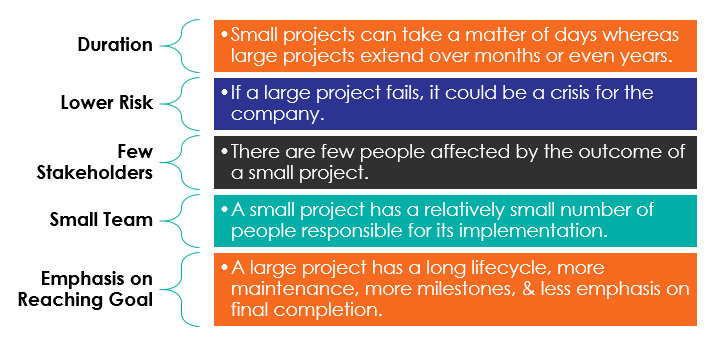
- Small projects take a matter of hours, days, or weeks, whereas large projects extend over months or even years.
- Lower Risk. A small project is not as likely to impact a business’s long-term success in a negative way if it doesn’t go well. If a large project fails, it could be a crisis for the company.
- Few Stakeholders. There are few people affected by the outcome of a small project.
- Small Team. A small project has a relatively small number of people responsible for its implementation.
- Emphasis on Reaching Goal. There is often an attitude of “getting it done” with a small project, while a large project has a long lifecycle, more maintenance, more milestones, and less emphasis on final completion.
In the introduction, you learned that it can be disastrous to mistake a project for regular work. How do you know if the task at hand should be considered a “project?” Here is a checklist to help you decide.
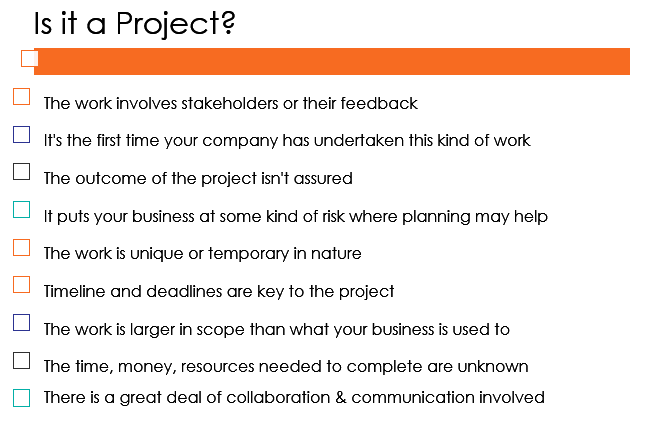
In module 1, we identified the three key phases of project planning, implementation, and closure. Here, we’ll take a closer look at what those mean for a small or medium-sized project.
Project Planning

During the project planning stage, no work is undertaken on the project. During this phase, you are strictly planning and organizing. The goal is to get everything in place so that work can begin and proceed smoothly.
Planning includes outlining the scope of the project, drafting a project charter and getting it sanctioned by its sponsors, and making careful budget estimations and scheduling. Each of these major components will be covered in the next chapter on planning.
Project Implementation
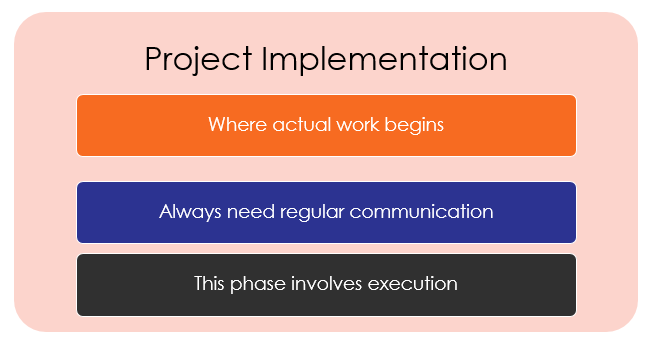
This is where the actual work on the project begins. On any project, no matter what the size, there will be a need for regular communication. The communication requirements for small projects are generally smaller, but since communication is so important, it cannot be overlooked.
For the most part, this phase involves project execution, which is the actual carrying out of the project plan that you created in your scope documents and schedules.
Project Closure
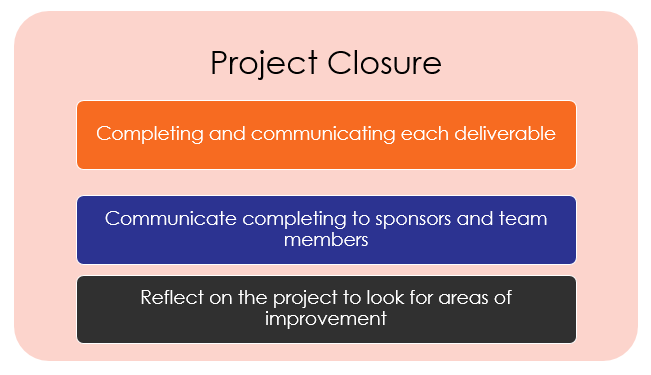
The main part of this phase is completing and communicating each deliverable. You need to communicate to the project sponsors that the project is completed and send all of the files or materials they need. You also need to communicate to all members of the project that it is officially closed.
This is also an important time for reflection. Since projects tend to be unique for businesses, you need to discuss key lessons learned with everyone involved. Count your successes and look at problems or failures in order to identify areas of improvement. Seek feedback from all involved, including the project sponsors.
Here’s the big picture view of the entire 3-phase project management process. We’ll be covering each of these phases in more detail in the remaining modules of the course, so keep it handy as a reminder of how everything fits together:
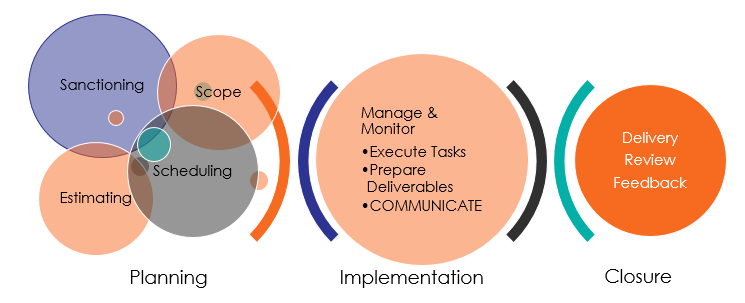
Activity:
- Select a project of your choice to use for the duration of this course.
This could be work that should have been treated as a project (think back to where you identified examples of work vs. projects).
If you don’t have anything current, is there a specific type of work that you do that would lend itself well to project management, or a project that you’ve been wanting to do?
Remember that projects are temporary, unique, and satisfy customer objectives.
A Word
From Tamara
As an entrepreneur myself I completely understand the stress, anxiety and frustration around launching or growing a business. I also know the rewards and life style change the hard work can provide you if you stay focused. I am here to inspire and motivate you to push forward. The fact that you’re investing in your business education let’s me know you’re in this to win. Rest assured I’m here to help you…. These courses are set up to help you understand the basics. To dig deeper into your specific plan of action we will discuss where you are, where you want to be, eliminate any blocks preventing you from getting to the next step and create an action plan.

Our superpower is making you a superhero.

